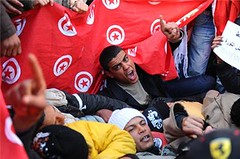
Tunisian masses are demanding the removal of the ruling RCD government. Since mid-December the workers and youth have demonstrated and revolted against the economic crisis.
Originally uploaded by Pan-African News Wire File Photos
By DAVE KANSAS
Wall Street Journal
Civil unrest is spreading across the Middle East, raising concern among investors about what will happen next.
When things happen in faraway places, it is difficult to figure how they will affect markets closer to home. Sometimes these events can scare the market, but they are usually short-lived. The Asian financial crisis in 1997 led to steep losses in the U.S., but the swift recovery makes the event seem like a blip today. Similarly, the 1994 peso crisis in Mexico and the 1998 Russian debt default and financial crises had short-lived impacts on U.S. markets.
.Unlike the Asian crisis of the late 1990s, the Middle East protests are political. In Egypt, millions marched and President Hosni Mubarak has agreed not to run for re-election after 30 years in charge. Before Egypt, mass protests toppled the government in Tunisia. More recently, the King of Jordan has dismissed his cabinet and the strongman of Syria, Bashar al-Assad, is talking about reform. In addition, Lebanon is going through its own messy government transition.
From the Maghreb of northern Africa to the Levant of the eastern Mediterranean to the Arabian peninsula, protests and unrest are unfolding in varying shapes. Even as far away as China, the government is restricting access to news about the popular movements, perhaps fearing the contagion could reach them.
"What is so important about the disturbances [in Egypt] is that they appear to have originated because of what happened in another country, Tunisia," Jim O'Neill, chairman of Goldman Sachs Asset Management, wrote in a recent report. "So, observers have to consider not only how this will develop in Egypt, but whether it will provoke similar protests in other countries around North Africa, the Middle East, and indeed, elsewhere in the world."
For investors, the combustible mix of protests and unpopular governments does indeed present a new challenge. Will things simmer down or will turmoil spread? And how will these events affect financial markets?
It may seem incongruent that the Dow Jones Industrial Average has surged above 12000 amidst the Middle East events. But with emerging and so-called frontier markets showing that political risk is real, investors are moving money back to developed markets, such as the U.S. and Europe. Popular emerging markets reflect the move. Year-to-date, India is down 12%, Brazil is off 5%, China is down about 3% and Egypt is down about 20%. Meantime, the Dow Jones industrials are up 4% and the European Stoxx 600 is up 3.6%.
Egypt and Tunisia alone aren't large economic players. The economy of larger Egypt is the size of Missouri's. But the risk is that events will spread, leading to instability across the region.
The biggest impact will likely come in the oil markets. Egypt controls the Suez Canal, a key chokepoint for oil shipments coming from the region. While Egypt itself isn't a big oil player, the Persian Gulf countries are. If popular unrest reaches those places, oil prices would likely jump sharply higher.
Already, West Texas intermediate crude oil has flirted with $90 a barrel and Brent crude, traded in London, has made moves above $100 a barrel, their highest levels since 2008.
Higher oil prices lead to higher energy costs, which can crimp consumer spending on nonenergy items. Since consumer activity makes up nearly 70% of U.S. economic activity, a severe spike in oil prices would have negative implications for the nascent economic recovery and could stoke inflation. The oil embargo of 1973 led to a jump in oil prices and stagflation -- inflation combined with anemic economic growth and high unemployment.
Nobody is credibly forecasting that kind of scenario right now. Some even think the protests could lead to economic and political reform that might ultimately help the region and the global economy. Of course, there are darker predictions, including a takeover of Egypt by extremists that would turn the country of 80 million into a Sunni Iran.
Along with oil, here are some other indicators to watch in order to divine how markets believe events will unfold.
Israeli stocks. There's little likelihood of political unrest, but Israel's neighborhood could get a lot trickier. The cold peace with Egypt has been a key element of Middle East politics for more than 30 years. Israel also has a peace treaty with troubled Jordan. The highflying Tel Aviv market -- up almost 15% in the past year -- could retreat.
Food prices. Analysts have cited spiking food prices as a key catalyst for the unrest in both Tunisia and Egypt. Yardeni Research recommends investors buy food commodities on the likelihood that governments at risk will take steps to grab and hoard available supplies in order to placate restive populations.
Gold. The ultimate flight to safety in a dangerous world, gold has briefly flashed yellow during the Egypt crisis. But it hasn't really reacted in a way that would equate with big trouble.
With protests still flaring across the Middle East, these indicators, and oil, bear watching.
—Dave Kansas is The Journal's chief markets commentator in New York. Blog: blogs.wsj.com/marketbeat Email: dave.kansas@wsj.com
No comments:
Post a Comment